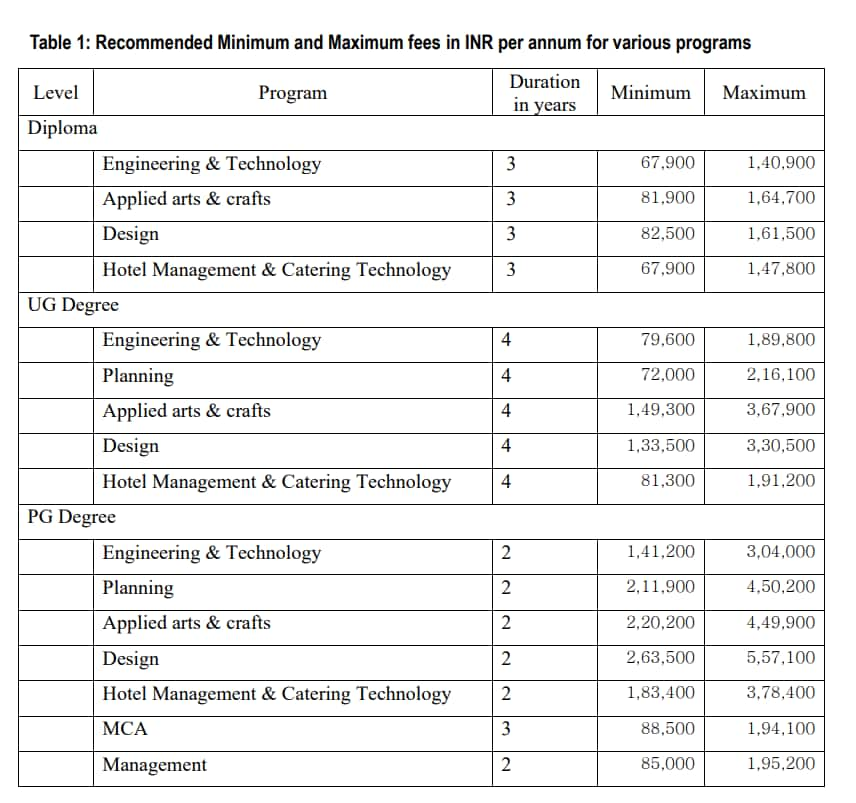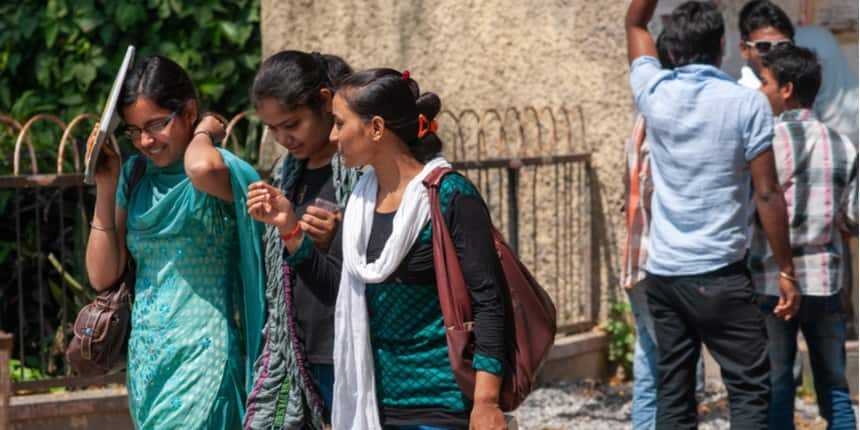The AICTE Fee Fee Report sets minimum and maximum fees for BTech, MBA, and other technical courses at approved institutions.
The proposed tariffs of BTech and MBA apply to AICTE-approved technical institutions.
New Delhi: To stop the commercialization of technology education in India, a committee composed of the All India Technology Education Council (AICTE) has proposed a maximum charge limit for institutions.
A committee led by Judge Sriklishna, a former Supreme Court judge, suggests that for undergraduate engineering programs, the annual minimum fee cannot fall below Rs 79,600 and the maximum is limited to Rs 1.89 Lakh. Did. In a two-year graduate program in engineering, the Commission proposed a minimum limit of Rs1.41lakh per year and an upper limit of Rs3.04lakh.
The limits have been revised from previous reports submitted in 2015. It recommends fixing the maximum price of UG’s 4-year engineering course from Rs 1.44 to Rs 1.58 per year. The Commission recommended a cap, but so far there was no minimum charge. The report was prepared for comments from the state, including state concerns and the response of the subcommittee.
The Commission said that apart from tuition fees, educational institutions can charge development costs limited to 15 percent of tuition fees. The development costs “need to cover system expansion and educational development, as well as non-recurring spending on large-scale repairs and replacements of experimental equipment, furniture, etc.,” the report said. ..
However, these proposed guidelines do not apply to institutions such as the Indian Institute of Technology (IIT) and the Indian Institute of Management (IIM) that do not require AICTE approval. If approved by the Ministry of Education and the state, the pricing system applies to all AICTE-approved technical institutions.
Read again | Do you need a JEE main? The AICTE scheme allows admission of “talented students” without exams
MBA pricing
For a two-year MBA or Graduate School of Business Diploma (PGDM), the Commission has proposed a lower limit of Rs. 85,000 and educational institutions cannot claim more than Rs. 1,95,200.
The Commission proposes that the Graduate School of Engineering degree (MTech) has a minimum fee of Rs 1.41 larks and a maximum fee of Rs 3.04 larks or less. For planning, applied arts and crafts, and design PG degree courses, the Commission has proposed a minimum fee of approximately Rs. 20,000.
The Commission has set a minimum fee of 67,900 rupees for a three-year engineering diploma course and a maximum of 1.40 rupees. Educational institutions may not charge a design diploma less than Rs 82,500 and may not charge more than Rs 1.61.
According to the Commission’s recommendation, the upper limit for diplomas in hotel management and catering skills should not be less than 67,900 rupees and should not exceed 147,000 rupees. On the other hand, the UG degree for the same course must be between Rs 81,300 and Rs 1.91.
Read also | Suspected fraud at Jharkhand BTech University. UGC directs “appropriate action”
The highest and lowest rates are set for a two-year PG course of planning, applied arts, crafts and design, Rs 2.1 racks, Rs 2.20 racks and Rs 2.63 racks per year, respectively.
Under the miscellaneous minds of medical institutions, placements, counselors and other such services, institutions can claim Rs 2,000 or less, the report states.
 AICTE revised the engineering course fee limit eight years later
AICTE revised the engineering course fee limit eight years later
BTech minimum price
The report also includes concerns and observations from 11 states, including Andrapradesh, Goa, Gujurat, Hariyana, Himachal Pradesh, Karnataka, Kerala, Madhya Pradesh, Maharashtra, Telangana and Uttar Pradesh. It contains.
One of the concerns raised by the state was that many technical agencies charged below the minimum standards set by the National Tariff Commission. In response, the report states: Human resources are also expected to be paid at least the lowest level of salary. “
The report further states that accredited institutions are “up to 25% additional tuition fees above the maximum fees prescribed for engineering and technology undergraduate programs, and up to 10% above the maximum fees prescribed for other programs. You can charge an additional tuition fee. ” ..
Read more | Kerala School Manual Health Plans, Toilet Ratios, Admission Guidelines
The report takes into account “students’ solvency” and for students from other sources such as industry and trusts, government subsidies, and simple education loans from financial institutions to state governments and institutions. I am asking you to arrange a scholarship.
SC, ST, EWS scholarships
There are scholarships for students in the Scheduled Castes (SC) and Scheduled Tribal (ST) communities that have historically reached their limits, but the report observes that the release of funds to the institute has been delayed. doing.
The Commission recommends that state governments introduce a mechanism for paying laboratories after being verified within three months of the submitted request. It also suggests that if repayment of fees from the state government is delayed by more than one grade, institutions should be allowed to borrow money to meet costs, especially salary payments.
The Committee also recommends that the rates applicable to all students in the class are the same and that differential rates are not allowed except for foreigners and non-resident Indians (NRIs).
Follow the latest educational news about universities, admissions, courses, exams, schools, research, NEPs, education policies and more.
To get in touch, please contact news@careers360.com.
..

